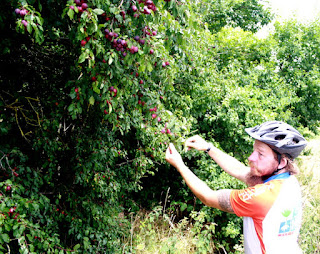Last
summer, three complete strangers and I set off on an experiment. We
wanted to see whether it would be possible to cycle the 3,500 miles
from the north of England to the Mediterranean along the west coast
of Europe. Oh, but I've missed the most important bit: We wanted to
see whether we could do it on a budget of £1 a day (approximately
US$1.50 or €1.40 at the time we set off). Obviously, £1 doesn't
buy very much food and so we'd supplement our groceries by foraging
and fishing.
The
biggest problem we had was that only one of us had extensive foraging
knowledge and he had to quit the ride after two weeks when his knee
exploded. Another problem we had was that none of us knew much, or in
fact anything, about fishing. Ever optimistic, we figured we'd pick
up this knowledge as we progressed.
Originally
I'd planned the journey to be entirely supported by foraged food and
with a budget of zero. But then I did some research and the only
similar bike ride I could find was a much shorter one – eight or
nine days – by Vin Cox, a very keen and knowledgeable forager,
who'd had to cheat after two days and buy a packet of biscuits and
who gave up entirely after a week when some dodgy road-kill made him
sick. So I decided, inexperienced as we were, we'd definitely need
that one pound. And I was right.
That
said, we did forage some really quite lovely stuff. As we were
already into summer, many of the common leaves – the dandelion and
nettles – were past their best, but the fruit was on its way. In
Britain we found cherries, plums and wild strawberries. In France,
this list was supplemented with blackberries, wild raspberries,
grapes and pears. In addition to nectarines and peaches, Spain gave
us so many apples we could have started a cider factory. And then
there were the sweet, sweet figs. Loads of them. We ate so many that
their rough, abrasive skins burnt our tongues and our digestive
systems were tested to the limit, and occasionally beyond.
It
wasn't all fruit. Other highlights included a delicious tea made from
elderflower blossom, and the not-so-delicious wine I tried to make
out of the same. It got tipped into the corner of a field that will
remain forever barren. Other good stuff included ramsons (wild
garlic), wild horseradish, huge bags of gorgeous marsh samphire and
the ever-so-slightly gnarly but tangy sea purslane.
If
our foraging was successful, our fishing wasn't. We ran a little
competition to see who could catch the most. I came joint first and I
only caught two fish, and I'm not entirely sure they weren't too
small to legally keep. I would have put our small haul down to our
lack of fishing knowledge but wherever others were fishing – people
who knew what they were doing, with loads of expensive-looking
equipment – they weren't catching anything either. Maybe there just
aren't any fish left to catch.
Did
we achieve our aim? We did. Just. It wasn't easy but we had a great
time, trying to find new species – I had a copy of the classic Food
For Free with me – and moving
southwards through Europe with its ever-changing culinary offerings.
If you ever fancy a cheap holiday, it's something to bear in mind,
although I'd recommend a larger budget than £1. And I'd also
recommend knowing more about foraging and fishing than we did. Much,
much more.
I'd
love to hear from anyone who has ever attempted anything remotely
like this.
Dave strips a plum tree
A selection of seaweed
Fishing unsuccessfully in France


